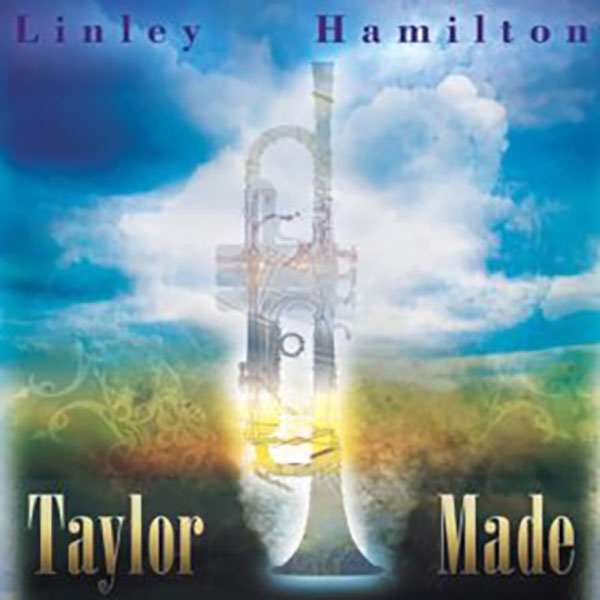
by Ian Mann
August 24, 2011
/ ALBUM
"Taylor Made" ranks as one of the best contemporary mainstream recordings.
Linley Hamilton
“Taylor Made”
(Lyte Records LR006)
Trumpeter Linley Hamilton is part of the burgeoning Northern Ireland jazz scene. The Belfast based musician has worked extensively in both the jazz and pop/rock genres appearing with artists such as fellow compatriot Van Morrison plus Jean Toussaint, Jacqui Dankworth, Ken Peplowski, Foy Vance, Paul Brady and The Commitments. He also introduces a late night jazz show on Radio Ulster with the appropriate title of “After Midnight”. His latest album appears on Irish drummer David Lyttle’s Lyte Records and is an accomplished “modern mainstream” set featuring an interesting selection of jazz standards, contemporary jazz compositions and arrangements of classic pop tunes .
Hamilton appears on both trumpet and flugel horn in a quartet setting that features pianist Johnny Taylor after whom the album is named. Taylor is very much Hamilton’s right hand man, an imaginative soloist and the arranger of many of the tunes on the album. The group is completed by bassist Dan Bodwell, an American living in Dublin, and drummer Dominic Mullan.
The album commences with the jazz standard “Without A Song”, the opening trumpet cadenzas demonstrating Hamilton’s purity of tone before the quartet kick in to deliver the tune at a fast clip. Hamilton’s immediately impresses with his fluency as a soloist and there’s a scintillating trumpet/piano duet mid tune just before a typically sparkling Taylor solo. Bodwell and Mullan swing prodigiously at the fast tempo and keep the pot bubbling almost throughout whilst simultaneously leaving the soloists plenty of room to work in. An impressive start.
“Fade A Little” is written by Roman and Julian Wasserfuhr, the young German jazz playing brothers. Roman (piano) and Julian (trumpet) are signed to the prestigious ACT record label for whom they have recorded two albums. “Fade A Little” is a sombre ballad that opens with a brooding but beautiful piano/flugel duet before moving on to absorb delicately nuanced drumming and deeply resonant but wholly sympathetic bass. The Wasserfuhr’s melody has a song like directness that sometimes recalls ACT label mates E.S.T. and Hamilton and his group serve the tune beautifully.
Alto saxophonist Kenny Garrett’s tune “Happy People” is well named. The jaunty, subtly gospel tinged piece is played with a real joie de vivre with as both Hamilton and Taylor solo in exuberant fashion and Bodwell and Mullan gleefully grapple with the complexities of the rhythms.
In a well programmed set “My Heart’s Desire” features the lush ballad playing of Hamilton with Taylor counterbalancing this by adding a subtle touch of the blues to the proceedings as the rhythm section keep things ticking along nicely. It’s another highly tuneful piece and once again the quartet bring out the full beauty of the melody within an imaginative arrangement.
The boppish arrangement of Rogers & Hart’s “This Can’t Be Love” allows Hamilton and Taylor to show off their chops with joyously fluent solos and Mullan enjoys a series of brief drum breaks. Great fun.
“Throw It Away” is another example of the quartet’s superior ballad skills with Bodwell’s bass solo an early highlight. Hamilton and Taylor once again contrast well on their solos, Hamilton cool and lyrical and Taylor more extrovert but tastefully so. The pianist is an excellent improviser, fluent and full of ideas, he always seems to have something interesting to say.
The two “pop” tunes are sequenced together, both substantially re-worked and re-harmonised. Carole King and Gerry Goffin’s “Will You Still Love Me Tomorrow” becomes a wistful ballad with Hamilton’s purity of tone particularly striking. Taylor’s solo features him at his most lyrical accompanied by the purr of Bodwell’s bass and Mullan’s crisply accented cymbal work.
Paul Simon’s “Have A Good Time” is given a slyly funky treatment and is propelled by Bodwell’s bass groove and Mullan’s neatly energetic drumming. Hamilton’s slurs and smears give the piece a very contemporary feel. Taylor comps energetically on the first half of the tune before later stretching out with a solo that seems to borrow from both the blues and Horace Silver.
The album closes with Woody Shaw’s “Rosewood”, a spirited bop flavoured workout that again demonstrates Hamilton’s tremendous technical facility plus the equally impressive abilities of his three band mates.
“Taylor Made” is an impressive piece of work. Hamilton may not have anything particularly new to say but what he does impart is delivered with sophistication and eloquence. As a trumpeter he has it all-he’s fluent, agile and inventive on the up-tempo numbers, cool and elegant on the ballads. Taylor is the perfect foil and his playing sparkles imaginatively throughout. Bodwell and Mullan are a superbly sympathetic rhythm section but still find room to impress on an individual basis. Hamilton’s liner notes emphasise the contribution of engineer David McCune and rightly so, the mix is wonderfully clear throughout with each musician captured at just the right level. As the title partly implies “Taylor Made” is a superb all round team effort and the love and care that went into this project is palpable. “Taylor Made” ranks as one of the best contemporary mainstream recordings.
blog comments powered by Disqus